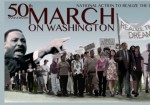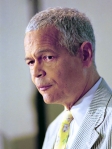 On this date in 1967, civil rights attorney Thurgood Marshall became the first African American appointed to the Supreme Court. In his 24 years on the Court, he was a stalwart defender of the oppressed, a strong voice for social justice, and a strong voice for the evolutionary model of Constitutional law clearly intended at the founding of our country. He wisely observed in a U.S. Bicentennial speech:
On this date in 1967, civil rights attorney Thurgood Marshall became the first African American appointed to the Supreme Court. In his 24 years on the Court, he was a stalwart defender of the oppressed, a strong voice for social justice, and a strong voice for the evolutionary model of Constitutional law clearly intended at the founding of our country. He wisely observed in a U.S. Bicentennial speech:
the government they devised was defective from the start, requiring several amendments, a civil war, and major social transformations to attain the system of constitutional government and its respect for the freedoms and individual rights we hold as fundamental today.
Born in 1908 in Baltimore, Marshall was the son of a railroad porter and a teacher and the grandson of slaves. His parents instilled in him a deep appreciation of American citizenship and the rule of law in a just society. He graduated from Lincoln University, where he was a member of the first black fraternity, Alpha Phi Alpha. He intended to go to law school at his hometown University of Maryland, but was turned away because of their strict segregation policy. He instead went to Howard University School of Law, graduating first in his class in 1933. Three years later, he represented Donald Gaines Murray in a case that forced Maryland to eliminate the policy that had kept him from its law school.
Marshall undertook that case as part of his work with the NAACP. He quickly rose to become their Chief Counsel. At the age of 32, he won his first case before the U.S. Supreme Court, Chambers v. Florida, a due process case involving undue police pressure on four African American men. He went on to argue 32 cases before the Court, more than anyone else, winning a stunning 29 of those cases. The most famous of those, building on his success in Maryland, was Brown v. Board of Education. In 1961, President Kennedy appointed him to the U.S. Court of Appeals for the Second Circuit, resorting to a recess appointment when a group of southern senators held up his confirmation. After four years on that bench, he was tapped by President Johnson to become the first African American U.S. Solicitor General. During his time in that role, he won an enviable 14 of the 19 cases he defended.
Strong-willed and successful, Marshall recognized that the American dream is not accomplished solely by personal determination.
None of us got where we are solely by pulling ourselves up by our bootstraps. We got here because somebody – a parent, a teacher, an Ivy League crony or a few nuns – bent down and helped us pick up our boots.
He also knew how much minority oppression worked against too many Americans, saying
A child born to a Black mother in a state like Mississippi… has exactly the same rights as a white baby born to the wealthiest person in the United States. It’s not true, but I challenge anyone to say it is not a goal worth working for.
With the famous observation that it was “the right thing to do, the right time to do it, the right man and the right place,” LBJ put Marshall forward for the Supreme Court when Justice Tom C. Clark retired. He served on the Court for the next twenty-four years, compiling a liberal record that included strong support for Constitutional protection of individual rights, especially the rights of criminal suspects against the government. He was a staunch opponent of the death penalty, believing it a violation of the Constitution. He participated in every dissent of death penalty cases during his time on the Court.
Justice Marshall also understood that equal rights apply to all, extending his work for racial equality to other oppressed communities. He joined in a spirited dissent of Bowers v. Hardwick, the 1986 decision that infamously upheld Georgia’s anti-gay application of its ludicrous sodomy laws. He also wrote influential opinions on labor rights, securities law, and taxation. He famously wrote a dissent in Personnel Administrator MA v. Feeney, saying that a law that gave hiring preference to veterans over non-veterans was unconstitutional because of its inequitable impact on women (Yes, standing up for equality for women was okay back then). A constant defender of individual freedom, he famously observed:
If the First Amendment means anything, it means that a state has no business telling a man, sitting alone in his house, what books he may read or what films he may watch.
Marshall also supported a women’s right to govern her own body and helped with the passage of Roe v. Wade. He was a stalwart defender of women’s rights and the right to choose.
In poor health, he retired from the bench in 1991, noting his dissatisfaction that his successor would be selected by George H.W. Bush. Those fears were sound. In a display of wanton tokenism, Bush appointed the integrity-impaired far right demagogue Clarence Thomas. That substitution heralded the beginning of the Court’s descent from defenders of individual rights and the rule of law to the Roberts’ Court’s flagrant obsequiousness to corporate power and individual greed. The Fecal Five on today’s Court would do well to listen to Marshall’s words:
Our whole constitutional heritage rebels at the thought of giving government the power to control men’s minds.
Fortunately, Marshall’s legacy lives on, with many of his opinions holding the force of law even today. His true successor on the bench was appointed by the first African American President when President Obama appointed former Marshall law clerk Elena Kagan to the Supreme Court. Marshall died of heart failure in 1993. His papers were given to the Library of Congress and — unusually but according to Marshall’s wishes — made open to scholars and researchers immediately. Many tributes and memorials to Marshall exist around the country but none are so strong as the legacy of the law he believed in, defended, and helped to shape for the betterment of all Americans.
Tags: Abortion, Black History, Brown v. Board of Education, Constitution, death penalty, Elena Kagan, Howard University, integrity, justice, labor rights, NAACP, Oppression, Racism, Roe v. Wade, Supreme Court, Thurgood Marshall
 Sadly, the 75 year old Bond passed away last night. Today I would like to honor and celebrate an outspoken pioneer for civil rights and social justice and one of my personal heroes. Horace Julian Bond was born in Nashville in 1940. He grew up in rural Fort Valley, GA, where his father was president of the university. He enrolled in Morehouse College, where he helped found the Student Nonviolent Coordinating Committee. He became its communications director and helped organize protests against segregation in public facilities in Georgia. He left school to spend more time as an activist; he would return to Morehouse and complete his BA in English at the age of 31–yay for English majors!
Sadly, the 75 year old Bond passed away last night. Today I would like to honor and celebrate an outspoken pioneer for civil rights and social justice and one of my personal heroes. Horace Julian Bond was born in Nashville in 1940. He grew up in rural Fort Valley, GA, where his father was president of the university. He enrolled in Morehouse College, where he helped found the Student Nonviolent Coordinating Committee. He became its communications director and helped organize protests against segregation in public facilities in Georgia. He left school to spend more time as an activist; he would return to Morehouse and complete his BA in English at the age of 31–yay for English majors!











